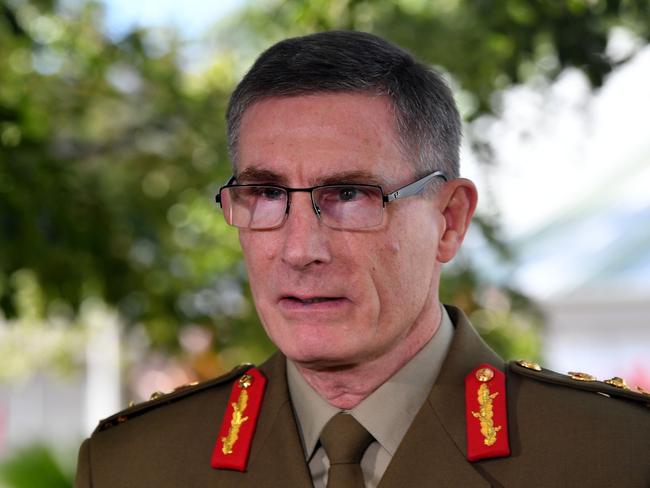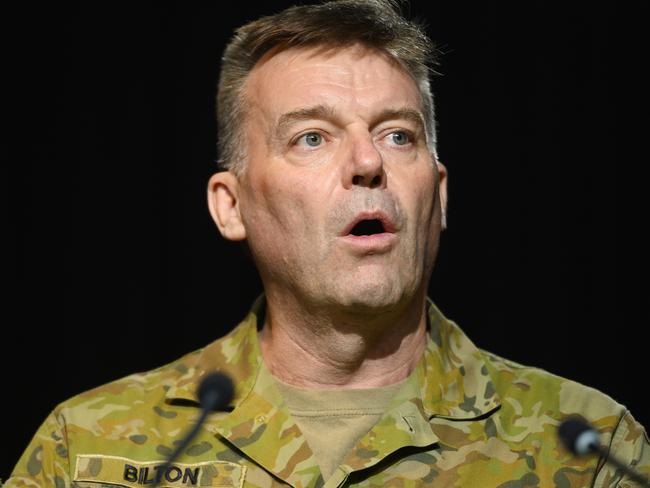Anthony Albanese extends term of Australia’s top military chiefs
Anthony Albanese has made an extraordinary move in Australia’s defence history citing a “strategically complex” time.
National
Don't miss out on the headlines from National. Followed categories will be added to My News.
The Albanese government has taken the extraordinary step of extending the contracts of Australia’s top military chiefs by two years, citing one of the most complex national security positions the country has been in since World War 2.
And security analysts say you have to go back that far when Australia was at war that such multiple extensions have been made.
Chief of the Defence Force General Angus Campbell was expected to finish up in a week’s time but will now remain in the top job as will his deputy Vice Admiral David Johnston and Chief of Joint Operations Lt Gen Greg Bilton.
Defence Minister Richard Marles said the government was aware this “additional burden” placed on them for another two years but said the expected end of their appointments came at too critical a time.
“The Albanese Government is putting a premium on continuity,” he said.
“This applies to strategic advice and the timely and effective delivery of key procurements including through the AUKUS framework,” Mr Marles said.
He added: “We arrive at a time which is as strategically complex as any since the end of the Second World War in terms of our national security and the needs of our defence procurement.”

That complexity includes the AUKUS security pact which will see Australia receive tech on nuclear-powered submarines and hypersonic missiles, expansionist moves by China, challenges in the Pacific and a Russia-Ukraine conflict that threatens to engulf the world.
New appointments for the armed forces were expected during the pre-election period when government operations went into caretaker mode on May 21 but a hint their posts could be extended came when Mr Marles praised the men for their work.
The previous government did not enjoy a similar relationship.
Mr Marles said the Australian Defence Force and through it the nation needed stability in command and continuity in advice and defence capability.
“General Bilton’s continued leadership in the planning and conduct of our military campaigns and exercises will provide ongoing stability and certainty,” he said.
ANU’s professor of international security and intelligence and defence studies John Blaxland’s immediate reaction was “wow, that’s amazing”.

He said it was a compelling argument to extend the contract of three of the top military men in the country and believed the move was unprecedented.
“There is no question he (Campbell) is very well placed to manage the complexities of the challenges that we are facing at the moment and likely to face in the next few years,” Prof Blaxland said.
“I can’t think of an occasion in living memory when we have done that. In war time we have extended … this seems pretty unprecedented, we have had back-to-back appointments we have had that before, but Angus Campbell had already been extended so this is significant.”
Gen Campbell, who has been CDF since July 2018, had his detractors in the Coalition government and was forced to stand alone publicly to announce the findings of the Brereton Inquiry into suspected war crime by ADF Special Forces.
But in the ranks he has always been seen as unflappable and well considered in his judgment.
“There is an opportunity with Richard Marles in the chair and Anthony Albanese to take a more considered view on the utility of someone like Campbell who is demonstrably a patriotic servant of the State,” Prof Blaxland, a former Army officer and director of intelligence at the Headquarters Joint Operations Command, said.
New appointments were made to the top of the three ranks including new Army chief Lt General Simon Stuart, Chief of Air Force Air Vice Marshal Robert Chipman and Vice Admiral Mark Hammond to take over Navy, the first former submariner to do so.
Originally published as Anthony Albanese extends term of Australia’s top military chiefs




